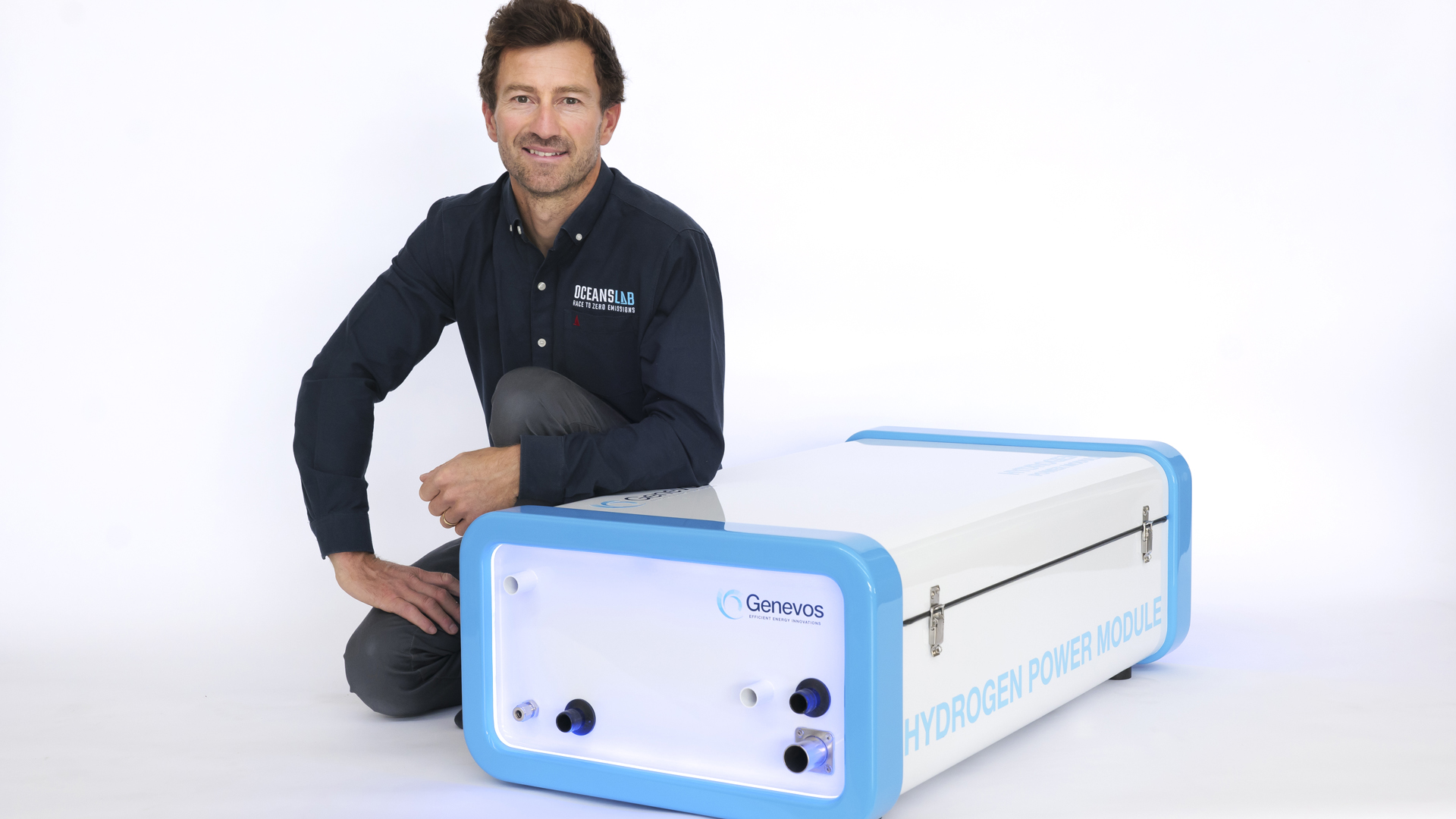Zero emission racing project ‘OceansLab’ announces the launch of hydrogen fuel cell solutions to accelerate maritime decarbonisation through clean-tech spin-off company, Genevos,.
OceansLab – Genevos – Maritime Hydrogen Power Module – Phil Sharp © Gilles Delacuvellerie
The Hydrogen Power Module (HPM) is a marinised plug-and-play solution to achieving zero emissions power for vessels. Water is the only by-product of the HPM, which uses a high-efficiency fuel cell to create electricity through the reaction of hydrogen sourced from renewable energy.
Free from toxic greenhouse gases, clean hydrogen has been named by the International Transport Forum as an important fuel for decarbonising maritime trade. What’s more, hydrogen created from renewables has been forecast to undercut all other forms of marine fuel by 2030.
“Fuel cells and hydrogen will play a vital role in the clean energy transition of this sector,” commented Phil Sharp, OceansLab skipper and Technical Director of Genevos. “To meet climate change goals all new boats and ships built from 2030 must be Zero Emission Vessels, using clean fuels. To achieve this, we have to start introducing this innovative technology now to ensure that we can scale up in time.”
Genevos will be producing a series of HPMs with power outputs ranging from 8 to 200 kW and capable of meeting a range of vessel sizes and energy demands. Modules can provide clean energy solutions for varied applications including primary or hybrid propulsion, in addition to powering auxiliary systems in large commercial vessels to prevent coastal and in-port emissions.
Renowned specialist in low carbon shipping and Associate Professor at UCL Energy Institute Dr Tristan Smith commented: “Zero emission technology and fuel is an inevitable future for shipping. The industry needs projects and pilots that use technologies such as the Genevos HPM, to kick-start this clean transition.”
Based in La Rochelle, Nouvelle Aquitaine, Genevos has an established research partnership with EIGSI University and its industrial power systems test centre through the development of a hydrogen lab. Testing is currently being carried out on an HPM-8 kW prototype whilst providing a focal point for research projects at the university.
The HPM-8 system will be on display at the Maritime Transport Efficiency Conference in Geneva next week, from the 5-6th of October.
Genevos are in the process of securing demonstrator partnerships for recreational and commercial hydrogen pilot projects and are interested in connecting with boat constructors looking for clean hydrogen solutions.
For more information please contact info@genevos.com or visit www.genevos.com.

OceansLab – Genevos – Maritime Hydrogen Power Module – EIGSI Industrial Lab © Gilles Delacuvellerie
Genevos HPM – Features
- Low Weight: Typically 60-75% lower weight than an all-electric system using the latest lithium battery technology
- Environmentally friendly: Zero emissions and virtually silent operation
- Fuel requirement: Green hydrogen which is created from electrolysers supplied with renewable energy. Hydrogen is a light, odourless gas and has been proven in industry for decades as safe to produce, store and transport.
- Plug and play: Fully-integrated systems in marinised enclosure for easy installation
- Practical: Modular and scalable for high range applications
- Efficiency: Hydrogen fuel cells are typically 2-3 times the efficiency of marine diesel engines
Maritime sector emissions and targets
- The international shipping sector currently accounts for over 90% of world trade, supported by over 53,000 merchant ships worldwide
- Shipping emits significant amount of pollutants, including NOx, SOx, particulate matters and carbon dioxide, to the atmosphere, which poses threats to human health and leads to acid rain and global warming
- According to the Third IMO GHG Study (2014) and the study published by Sofiev et al. (2018), the SOx and NOx emissions from shipping accounts for about 13% and 15% of the global emissions respectively and the air pollutants from shipping contributes to around 403,300 premature deaths per year
- The carbon dioxide emissions from shipping were reported to average 3.1% per annum between 2007 and 2012 of global emissions, which is greater than carbon emissions from aviation. As the population grows so does the maritime trade, the carbon dioxide emission is expected to grow up to 250% by 2050 if no measure is taken (IMO, 2014)
- By 2050, the IMO aims to deduct the greenhouse gas emissions by >50% compared with 2008 level. This does not however comply with IPCC targets
- In order to limit global warming to 1.5 °C above pre-industrial levels in line with the IPCC targets, shipping emissions need to be reduced to zero by 2050 which requires nearly all vessels built from 2030 to be zero emission
